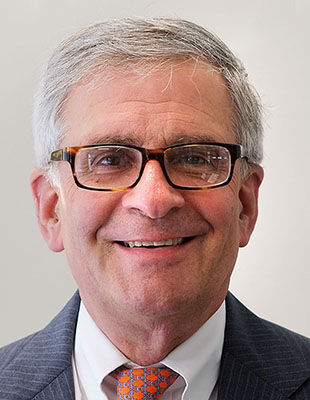The overhaul of American attitudes toward immigration has many fronts. One is the border, both the southern and northern frontiers. Another is workplaces — Mexican restaurants, manufacturing plants like the Hyundai facility where hundreds of Koreans recently were arrested — where the undocumented are found. A third is this week's emphasis on sanctuary cities, which harbor many of the migrants Donald Trump is targeting.
But there is another, largely ignored by the public but increasingly taking on importance.
The targets are not here illegally. Indeed, they are on the cusp of becoming American citizens. The only obstacle is the citizenship test that is required for the last step. It's an easy exam. Fifth-grade students could ace it at the end of their year of rudimentary history instruction.
Now Trump administration officials want to toughen the test.
They are contemplating an essay requirement that they say will give indications of applicants' "moral character." A memo released last month by U.S. Citizenship and Immigration Services speaks of an effort to achieve "a holistic assessment of an alien's behavior, adherence to societal norms, and positive contributions that affirmatively demonstrate good moral character." Such an assessment also might provide insight into applicants' abilities and attitudes and perhaps their political inclinations.
But the irony is that the citizenship test — easy, straightforward and administered verbally by a government official who chooses as many as 10 of the prescribed civics questions, available (with answers) to the applicant in advance — is full of the sorts of questions that are top of mind in the country's politics in this fraught era.
Here is an annotated look at some of the questions that a potential citizen could encounter and the prescribed acceptable answers:
• What is the supreme law of the land? The government offers only one answer: the Constitution.
This is pretty straightforward, but ease of answer does not mean ease of understanding. What the Constitution says — what the Constitution means — is, as Americans have seen since 1803, when judicial review began, subject to interpretation and to fevered debate. The applicant for citizenship won't be asked, for example, whether the Second Amendment language of the "right to bear arms" refers to a militia or to an individual. When President Trump was asked on NBC's "Meet the Press" five months ago whether he had to uphold constitutional requirements for providing migrants with due process, he replied, "I don't know."
• What stops one branch of government from becoming too powerful? Every American schoolchild knows the answer to this one. The study guide for citizenship applicants sets out the two acceptable answers: checks and balances and the separation of powers.
No problem — until we get to their implementation.
How these two easily understood concepts are applied to the actual functioning of government isn't quite so clear. The Supreme Court under the Franklin Delano Roosevelt and Richard Nixon administrations reined in the executive branch. The legislative branch in the Nixon years stymied the executive branch when Congress passed the War Powers Act of 1973 (meant to restrain presidential discretion in military operations) and the Impoundment Control Act of 1974 (which required congressional approval for the rescission of funds) — two areas that have become areas of contention in the past eight months.
Indeed, at the heart of this seemingly uncomplicated question is its application to contemporary politics.
Powers that are separate and that provide checks on other branches of government are relevant only if they are engaged. In the past several months, the legislative branch hasn't chosen to check the power of the executive, but it also hasn't asserted its right to underscore its prerogatives as a means of preserving its separateness from the executive — something the Republicans may wish they had done the next time a Democrat is president. A generation ago, Democratic Sen. Robert Byrd of West Virginia deliberately asserted congressional authority in the face of actions of a president of his own party, Jimmy Carter, in the matter of the president's unilateral suspension of 19 congressionally authorized water projects.
• What is the "rule of law"? A concept with origins in ancient Greece and renewed with the Magna Carta, this is a term that emerged at the beginning of the 17th century growing out of criticism of British royal economic regulations. It's perhaps the fundamental element of American civic life.
The government study guide provides three acceptable answers, each with challenges in our age:
Government must obey the law — a concept tested by the recent deployment of federal troops in American cities that may violate a 19th-century law prohibiting the use of the military forces to enforce civilian law.
No one is above the law — a precept constantly cited by presidents but often jeopardized by presidents. Nixon, in his post-presidential interview with David Frost, said, "When the president does it, that means it is not illegal." Trump, at a Cabinet meeting last month, said, "I have the right to do anything I want to do."
Leaders must obey the law — a notion tested by the recent detainment and deportation of student protesters and foreign scholars. (A separate question in the citizenship test asks: "Under our Constitution, some powers belong to the states. What is one power of the states?" One prescribed answer: "provide protection (police).")
• Who is in charge of the executive branch? The answer here is simple: "the president." The implications of that answer are not simple.
In recent months, a consequential debate has unfolded over the Constitution's Article II language stating, "the executive Power shall be vested in a President."
Questions about the "unitary theory of the executive" that empowers the president have swirled around government circles for four decades; George W. Bush employed it in matters of executive privilege and the creation of various "czars" for specific policy areas. But only this year has this theory entered broad public discussion.
Proponents argue the founders saw the president as the supreme figure of the executive branch, thus providing broad powers over departments and agencies. Opponents argue, as Syracuse University law professor David Driesen put it in a 2021 University of California Law Journal article, that "centralization of head-of-state control over the executive branch provides a pathway to autocracy."
In the days following Sen. Byrd's complaint about Carter's water-project cancellations, conservative-leaning Democratic Sen. J. Bennett Johnston of Louisiana denounced "government by executive." This matter is a test not only for citizenship applicants — but also for the government itself.
•••
David M. Shribman is the former executive editor of the Pittsburgh Post-Gazette.



















(0) comments
Welcome to the discussion.
Log In
Keep it Clean. Please avoid obscene, vulgar, lewd, racist or sexually-oriented language.
PLEASE TURN OFF YOUR CAPS LOCK.
Don't Threaten. Threats of harming another person will not be tolerated.
Be Truthful. Don't knowingly lie about anyone or anything.
Be Nice. No racism, sexism or any sort of -ism that is degrading to another person.
Be Proactive. Use the 'Report' link on each comment to let us know of abusive posts.
Share with Us. We'd love to hear eyewitness accounts, the history behind an article.